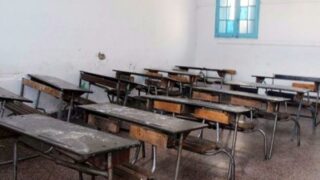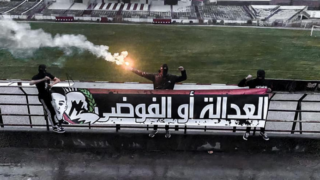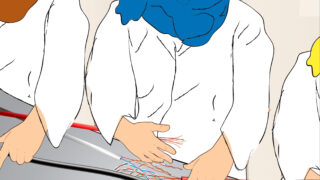What comes after Mahmoud Darwish? Rap! Yes! What is so weird about that? This is by no means an attempt to theorize about the end of poetry. It is just that the current phase requires different purposes and methods of speech. No time for rhymes, grammatical arrangement of words or compositions. No time for vagueness and inspiration. By the time Darwish finishes preparing his coffee and fixing his tie, it will be too late. Satire will not be enough. We need something more lethal and perhaps even more obscene. Something that befits the atrocity looming on the horizon. We have to create new weapons. Our speech ought to be like machine guns: rapid, accurate, dissecting and straight to the point.
The rulers of yesterday lacked dignity, even if they were fond of praise. The rulers of today, however, are worse, and nothing appeals to them. We need to resort to the whole profanity repertoire to be up to the level of the upcoming disasters. Enter rap music!
There are currently thousands of young men and women in Tunisia who do not know Sheikh Imam, and Marcel Khalife is not one of their top music choices. These young men and women, however, have toppled a regime and succeeded in what previous generations had failed to achieve. These previous generations grew up listening to the poetry of Muzaffar al-Nuwwab and Ahmed Fouad Negm as well as to the songs of the Music Research Group and the White Doves Group.
These young men and women do not know the meaning of “committed art,” but they are radically committed. They are committed to life, and they have chosen discontent as a tool to live. They are currently disgruntled more than ever before. Nothing represents them. They took to the streets to have a “future,” only to be rewarded with a nonguaranteed fate. Nothing is guaranteed in Tunisia, now that its pilgrims go on pilgrimage to the house of God with fake passports and visas.
These numerous disgruntled young men and women are not bilingual: they neither speak English nor French. They have their own “official” language. They have a forked tongue with which they feel and express. They have their own eloquence. They have a language with no rules at all, a hybrid and varied language. It is not one language, but a multitude of languages.
Rapper Klay BBJ was sentenced to six months on charges of insulting the police and brushing on public sensitive topics in his songs. Weld El-15 was sentenced to 21 months in prison on charges of insulting the police after he had been released from a two-year prison sentence because of a song in which he had compared police to dogs. There are also Hamzawy, Kavon, the Phoenix, DJ Costa, General and many others. Rappers in Tunisia are the first line of defense to preserve the last remainder of the revolution: freedom of expression, or rather the freedom of suffering loudly.
Freud would have said that they were suffering from “verbal frustration.” Sociologists may say that their organization, expression and clothing suggest that they are establishing a new type of tribalism that tears the social fabric upon which the modern state is based. Anthropologists may say that rappers engage in a verbal culture and an old tradition. Much can be said, but they are just ramblings. Today, there are young people in prison in Tunisia, and others are threatened to face the same fate because of their songs. We want them released immediately, do you understand?
Now that poetry, theater and literature failed to insult the shamelessness of the new regime, it has become crystal clear that the art of rap is the strongest and most effective tool of resistance. This is not a time for insinuation, allusion or gesture. Today’s rulers do not understand metaphors and euphemism. There is no time for prosody. We need a confrontational art. We need to call things by what they really are: a dog is a dog, a lowlife is a lowlife and a policeman is a policeman.
What distinguishes the art of rap, in its Tunisian form, and turns it into a threat to the emerging dictatorship is its evolution and superiority in terms of tools. The new authority is still using the same old tools of repression. It prosecutes “outlaws” according to the very laws of the old regime, now that the accountability project failed and the hopes of establishing a court faded away. The victim is now under the whim of the executioner, but that is a whole different story.
Rap is characterized by its timeliness and huge ability to strike while the iron is hot. It is the art of contingency par excellence, and it has social depth. Therefore, it is a horizontal art. Just like it emerged in the US ghettos in the early 1970s, it is emerging in Tunisia from the slums and marginalized groups. It is the “minority art,” despite the immense popularity it enjoys among the youth. The developments that occur in the morning are translated by rappers at night. They make songs that spread on the web at record speeds.
Rappers have a wonderful ability to interact and capture events and facts that take place in their forgotten surroundings. They then amplify these developments and return them to reality like snowballs that increase in size until they are impossible to stop or overlook.
Rap is also characterized by its awesome protest and mobilization ability. It is a mobilization art. It spreads fast. It is flammable and stronger than infection. A rap song can be uploaded to YouTube and shared, and within two hours it would have hit more than 10,000 views and downloads.
Rap is an open and independent art. It poses a threat to everyone: record labels, official marketing means, artists associations — which did not recognize “rap” and find it difficult to contain — as well as the ruling power and the temple guards in the first place.
Rap lays the foundations for a new culture and a new style of living. It contradicts the community project that the new power is trying to install in Tunisia by all means possible. The issue of artificial identity and the “Islam is in danger” card — played by the new regime to gain the largest possible popular sympathy, after it failed to resolve the vital and daily issues that the Tunisians revolted against — was overcome without the need to raise any fuss about it.
Young rappers do not face any problem at this level. Even though rap is foreign, they have come to “localize” it by incorporating it in their identity, already rich in its nonhomogeneity. These young people were able to spiritually and psychologically evolve to be the sons of their time. The only problem that remains — and it is clearly evident in their songs — is the same problem against which they revolted on January 14: jobs, freedom and national dignity.
Translated by Al-Monitor



